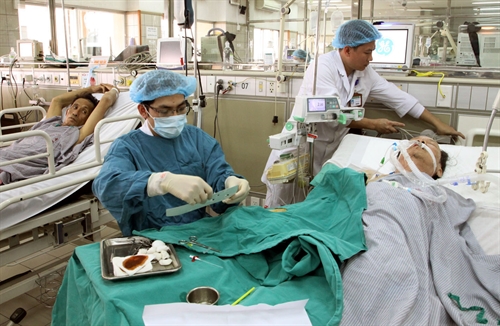 Society
Society

Việt Nam is seeing an increase in the number of people with anaphylaxis, according to experts at a conference last week on emergency critical care medicine and medical toxicology.
 |
| Bạch Mai Hospital doctors treat a patient with digestive problems. Food allergies are a major cause of anaphylaxis, which sometimes results in death. – VNA/VNS Photo Dương Ngọc |
HÀ NỘI – Việt Nam is seeing an increase in the number of people with anaphylaxis, according to experts at a conference last week on emergency critical care medicine and medical toxicology.
Coupled with the rising frequency of allergic reactions, many people don’t receive medical care until it’s already too late, resulting in a high death rate.
Professor Nguyễn Gia Bình, head of the Emergency Critical Care Medicine Department at Bạch Mai Hospital, said the hospital used to only see a few cases of anaphylaxis per year, but in the last few years, they have seen anaphylactic shock cases daily.
“Anaphylactic shock is seen more frequently and has become more complicated,” he said.
According to the World Allergy Organisation, anaphylactic shock can be defined as a widespread and very serious allergic reaction. Symptoms include dizziness, loss of consciousness, laboured breathing, swelling of the tongue and breathing tubes, blueness of the skin, low blood pressure, heart failure and death.
Immediate emergency treatment is required for this type of shock, including the administration of epinephrine in the case of bee or wasp stings.
Bình blamed the increase of anaphylaxis in Việt Nam on the rise of certain medical interventions, particularly among women who undergo cosmetic surgeries.
He also warned about food allergies causing anaphylaxis.
He said one female patient around 20 years old was allergic to Indian taro. Her mouth became itchy after eating Indian food for the first time, but after eating it a second time, she could hardly breathe. Doctors at Bạch Mai Hospital helped get her heart beating again, but her brain shut down because of an oxygen shortage.
Bình said that people with anaphylaxis can be saved if they receive immediate proper medical care.
However, there are no clear symptoms or signals that warn people about anaphylaxis, and it can happen anywhere, not only in healthcare centres or hospitals.
"Even in hospitals, patients may die if they are injected with an anaesthetic, because some may be allergic to it and unable to alert doctors," Bình said.
He said that in the last two years, Bạch Mai Hospital administered adrenaline to treat anaphylaxis in a pilot programme with clinical tests on 161 patients.
Bình, who is also president of the Việt Nam Association of Emergency Critical Care Medicine and Medical Toxicology, said that intramuscular adrenaline could be an effective and affordable way to save anaphylactic patients.
He said that if the treatment were approved by the Health Ministry for widescale usage, adrenaline should be available on airplanes, firefighter trucks, and emergency vehicles, and carried by workers in remote areas like border guards and forest rangers.
People who experience allergies should always carry it with them, he said. -- VNS